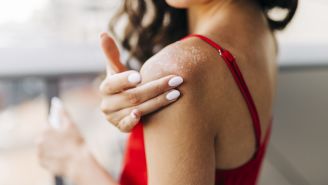There’s nothing like hearing the word “suspicious” applied to an innocent-looking mole to get you thinking about sun safety. Growing up in California in the sun-worshipping seventies, my main worry was whether my tan was dark enough, not sun damage or skin cancer. Oops. But it’s not just my generation—young people are getting skin cancer at alarming rates. Malignant melanoma is now the most common cancer among people 25 to 29 years old.
Yet despite the fact that we know so much more about sun damage and skin cancer today, it’s surprising how little most of us know about sun safety. In fact, a study by the American Academy of Dermatology found that only one-third of those surveyed knew the basics of sun protection.
As a quick primer, here are some key dos and don’ts:
DON'T
- Don't rely on shade or screening devices. You meet a friend for lunch and deliberately choose a table under the awning or an umbrella. Good thinking -- unfortunately, sunlight reflects from pavement and walls.
- Don't ignore the weather. Clouds, fog, and haze mean nothing to UV rays, which come right through. In fact, bad sunburns are most common on hazy or foggy days, experts say. Wind and temperature are particularly deceptive; it may feel cool but the sun is just as bright. Wear sunscreen when you go outside regardless of the weather.
- Don't ignore the time of day. Schedule sun-intensive activities before 10 a.m. or after 2 p.m. to avoid the midday sun.
- Don't forget danger zones. It’s no accident that skin cancer often shows up in odd places: on the feet, lips, hands, back of the ears, chest, neck, lips, and scalp. These areas are often in direct sunlight, but not commonly protected with sunscreen. Everyday sun exposure can actually be as bad for you as working on your tan, because it’s cumulative, experts say.
- Don't rely on a cover-up. Most of the fabrics used for bathing suit cover ups don’t block the sun’s rays. So they may protect your vanity, but not your skin. Use sunscreen under cover ups.
DO
- Forget the idea of a base tan. Getting some color in your skin doesn’t protect against damage or cancer the next time you’re in the sun.
- Be a label sleuth. Read sunscreen packaging and labels carefully for key words and phrases. Look for the minerals zinc and titanium, as these provide a physical block against the sun’s rays.
- Get ahead of the game. Apply sunscreen at least 20 minutes before you head outside.
- Remember the one-hour rule. That’s how long sunscreen lasts—period. Ignore the promises on the bottles and labels. Reapply every hour, no matter whether you’re sweating, swimming or just lazying around.
- Be skin-suspicious. When you see a mole or spot on your skin that looks unusual, odd or just different from how it looked before, see a dermatologist. There are some typical signs of melanoma you can look for: irregular shape, scalloped or jagged borders, large size (bigger than a pencil eraser) or rapid growth. However, other types of skin cancer, such as basal skin carcinoma, can be harder to spot. And unfortunately, there are exceptions to every rule.






